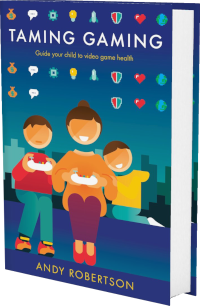 Android
Android iOS
iOS Mac
Mac Switch
Switch Wii
Wii Wii U
Wii U PC
PC PS4
PS4 PS5
PS5 Xbox One
Xbox One Xbox X|S
Xbox X|S24/01/2024 3 months ago Author: Andy Robertson
There are many reasons that children love to play video games. However, most of the talk about this rushes to protect children or accuse video games. This underestimates children and misses many of the reasons they play video games. I was inspired by Luke Billingham and Keir Irwin-Rogers' book on Youth Violence, to find a new way of talking about excessive video game playing that sheds fresh light on its benefits and reasons.
With so many new and growing challenges facing children, it’s easy to misunderstand their ways of coping, particularly when they are unfamiliar or risky. Rushing to protect children by controlling their behaviour, not only mixes up the behaviour with the problem it is solving, but can cut them off from legitimate and hard-won ways of coping with (or indeed improving) the world we are handing them.
Of course, some ways of coping are more damaging than others and demand more urgent attention. Violent behaviour, for example, can have lifelong implications in the life of a child. Addiction is another example where adult intervention becomes increasingly important.
However, coming at this from the perspective of the child (as much as is possible) helps us avoid demonising the child’s problematic activity or rushing to control coping strategies. Instead, we can look to understand the situation that these behaviours are being used to cope with.
Coping Through Gaming
One behaviour I’m particularly interested in is the steady increase in young people playing video games. In particular, the increase in gaming by young people struggling with other areas of life. For those of us who are older and who don’t play video games in the same way, it’s easy to see this as a powerful industry steadily entrapping ever more players for greater profits. But this underestimates the intention with which children decide how to spend their time.More than worrying about persuasive design tricks, or the impact of video games on behaviour, we need to understand what it is children find in video games that is so appealing and well-fitted to their lives. Moving from a damage-focused to a desire-focused outlook described by Eve Tuck we can look for the meaning found in these games that we don't yet understand. “This aims to depathologize the experiences of dispossessed and disenfranchised communities so that people are seen as more than broken and conquered.”
For example, Tuck’s uncovering of the real reason that young people were choosing to enrol on a General Educational Development (GED) program.
“CREDD’s research took a desire and complex personhood approach by insisting that there must be other values that youth place in the GED—that youth aren’t being duped into getting a meaningless creden-tial but, rather, that the meaning they place in it isn’t understood by existing research.”
Insufficient Ways to Matter
Luke Billingham and Keir Irwin-Rogers write about the importance of a social harm perspective to better understand violence in children and young people’s lives. This highlights how the ongoing belittlement of young people plays as much a part in violent behaviour as bad choices, problematic individuals, families or neighbourhoods.“Though growing up is never easy, different young people face very different predicaments when attempting to establish a sense that they matter - that they are a significant and consequential part of the world. All young people of course have choice and agency in how they navigate their lives and in how they seek to secure a self-perception of mattering. But there are vast disparities in the material and social resources available to young people and in the structural harms that they are exposed to, shaped in large part by a young person's social class, gender and racialization.”
This lens can also help us understand children who play video games rather than go to school, eat with the family or look after their hygiene. Rather than using games as a convenient blame receptacle (to distance ourselves from the insufficiencies of childhood in our culture), the social harm perspective sheds light on how this behaviour makes sense from a child’s point of view, particularly in relation to the various forms of difficulty, diminishment, and devaluation they may experience.
Thinking about young lives through the lens of exposure to social harms helps us appreciate the precarious situation of many children, in terms of housing, finance, schooling and work prospects. Add to that the structural and institutional ways in which children can feel disempowered and belittled, and you have an intolerable deadend.
Gaming To Matter
Violence and excessive gaming are different routes to finding a way to matter in the world. Perhaps this explains why the most popular games are also the most violent. In the virtual world, like the real world, this is a powerful route to feeling bigger, more consequential, more substantial and, ultimately, that your presence matters.However, video games also have the potential to offer children more than cathartic power fantasies. As Nguyen explains in Games: Agency as Art, video games are a unique way to bottle what it feels like to be someone (or somewhere) else, so we can pass it around for others to experience.
“We have developed methods for recording stories: novels, poetry, film, and other kinds of narrative. We have developed methods for capturing sights: drawing, painting, photography and film. We have developed methods for capturing sounds: written music, recording technologies, and wooden duck calls. We have even developed methods for capturing sequences of action to be performed — cookbook directions, dance choreography, and stage directions. Games are a method for capturing forms of agency.”
A video game invites us to experience not only what alternative realities can look or sound like, but how it feels to have a potent degree of agency, which a child or young person might be lacking in the real world. It’s no surprise that young people, in environments where they are structurally belittled, have flocked to video games as a chance to get a taste of what it feels like to matter.
While this potential is a blind spot to parents, youth workers, teachers and policymakers, the markets (unsurprisingly) are very aware of how well-fitted video games are for this generation. Games like Fortnite and Call of Duty create space not only for violence but for intricate hierarchies, prestige signalling, a hometown feel, heroic performance, self-improvement and routes to mattering on a global stage.
Discovering New Ways to Matter
Companies offer these nuanced and exhilarating experiences because the crowd of players they create is ripe for monetisation. However, there’s an opportunity to use video games for something less financially motivated: as a means for children to discover new ways to matter.- This might be time spent with complex puzzle games (like Baba Is You) that result in children improving their problem-solving and lateral thinking skills and coming to see themselves as being good at finding solutions.
- This might be time spent co-ordinating teams in Enlisted that result in an enthusiasm for disciplined teamwork.
- This might be time spent exploring different realities in Everything that results in children finding an appetite for philosophy.
- This might be time spent building boats that can cope with the roughest seas in Stormworks that results in children falling in love with fabricating.
Of particular interest, are games that offer a chance to step into other scenarios, where someone is belittled or shamed. Perhaps a game about a refugee (like Bury Me My Love) or running an impossible business (like Cart Life). These offer a first-hand chance to experience other people’s belittlement, which can lead to the player reflecting on how this functions in their own lives.
Reframing Gaming
For this to happen there needs to be a reversal of how we see video games in the lives of children. Currently, a child who excessively plays a video game as a way to cope with the world is considered to be wasting their time, misguided or addicted. This inadvertently further belittles their (often ingenious) way of moving towards mattering without resorting to more harmful behaviours (such as violence). We risk instigating an additional form of harm if we move to limit, diminish or cut children off from what we think is a damaging habit.Instead, we can respect this inventive means children use to cope with an often challenging and anxiety-inducing world. We can support their chosen coping mechanism while listening and learning about the problems they are experiencing. Where we have a sufficient relationship with the child (and literacy about the breadth of video games), this enables us to introduce games that offer ways to experience new ways they might matter.
In this way, video games can offer new routes for youth workers to connect with hard-to-reach young people for whom games are important. This is a good place to start but comes with a duty of care to the complexity and nuance of games in the lives of young people. What Eve Tuck describes as important ethical guidelines to ensure we “protect cultural, intellectual, and sacred knowledges from being stolen, appropriated, or handled in ways that are disrespectful”. For me, this means a parallel commitment to discover and play games ourselves and on our own, maybe requiring some personal sacrifice of our reading or watching time.
The authenticity and relationship required for this to be effective means that it isn’t just another short-term, pseudo-innovative and novel programme looking to attract funding as a purported “solution” to entrenched youth issues. By respecting video games as a resource already at work in the child’s community, in a way promoted by Asset Based Community Development, we aren’t positioning ourselves as children’s saviours, but supporting the ways they are looking for meaning and mattering. In fact, the nature of many video games is to highlight and bring to the fore the systemic problems in society, in a way that resists quick and superficial sticking plaster solutions - helping us to envision alternative ways that our societies could be organised.
Mattering Digitally and In Real Life
These video game experiences don’t only offer a way to compensate for what is missing in the real world with something virtual or less than real. In the lives of children, the boundary between the virtual and physical doesn’t work like that. The two overlap and are enmeshed in ways that are often surprising to those of us who are sentimental about (more readily understandable) non-digital childhoods.Playing a game, more than any other media, is felt in the body of the player. Discovering that you love organisation, mathematics, architecture, storytelling, shipbuilding, problem-solving or systematic thinking when playing a game, means you have tasted what it feels like to matter in that way in the real world.
If, in the digital realm, you discover forms of competence, agency, mastery, and connection which enrich your sense of value and significance, the enlivening consequences of this will not disappear when the console, computer or device is switched off.
The more I understand about social harms and mattering, the more excited I am at the idea of mobilising video games in the lives of children in service of their flourishing. Not least because this is something that children are doing for themselves already. In many ways, it can offer a similar positive trajectory to sport, although it is the home territory for many for whom sport involvement isn’t an option.
I hope I have usefully sketched out the potential benefits of the overlap between children's and young people’s sense of mattering and video gaming. This of course warrants further discussion, but in the meantime, I’d offer the following points as a useful starting point:
- Playing video games has the potential to enhance relationships, both with peers and adults which is an important component of mattering.
- Playing video games can enable children and young people to feel a greater sense of mattering during the game as they place themselves in the situation of a character who exhibits agency.
- Playing video games can extend a young person’s sphere of competence. They gain confidence, skills and experiences in games which help them to feel that they matter and heighten confidence to seek new achievements in real life.
- Playing video games can be a powerful way to uncover and experiment with previously unconsidered ways of mattering in the world.
 | Andy Robertson |
References:
- Against Youth Violence: A Social Harm Perspective - Luke Billingham and Keir Irwin-Rogers
- What's the best we can expect of media literacy? From protectionism to human rights and flourishing - Sonia Livingstone
- Social exclusion predicts violent video game preferences and fuels aggressive inclinations in adolescent players - Alessandro Gabbiadini and Paolo Riva
- Violent video games found not to be associated with adolescent aggression
- Games: Agency as Art - C. Thi Nguyen
- Suspending Damage: A Letter to Communities - Eve Tuck
© 2024 Family Gaming Database












